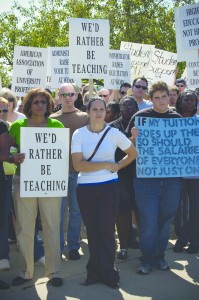Contract negotiations resume

With the current teacher contract expiring before the start of next fall semester, Oakland University and the American Association of University Professors will begin negotiations for a new agreement this summer.
“So far we are following a typical preliminary negotiating schedule,” Karen Miller, OU AAUP president, said.
According to Miller, a year before contract negotiations are scheduled to start, the AAUP elects a bargaining team.
From there, the group goes through recent agreements that other schools have come to with their teachers’ union, and speaks with representatives from OU’s various departments in order to get a clear set of issues to bring up during the negotiations.
Issues facing instructors
Miller explained that governance issues tend to inflame the faculty the most. She said that the faculty believes that it is important for them to be able to come up with their own curriculum.
According to Michael Latcha, OU AAUP chief negotiator, professors are also worried about retaining their right to intellectual property. He believes that if intellectual property rights are changed it would be much harder to attract new faculty.
“Currently faculty own everything they produce … the university would like that to change,” Latcha said.
Miller believes another problem for the university is the ability to keep the professors that are already on staff with the pay scale that is currently in place.
She explained that AAUP uses data from the College and University Professional Association for Human Resources to gage the average teacher’s pay.
“If we want to continue to grow Oakland University into a nationally recognized school we will have to compete with schools like UM (who are in the upper tear of the CUPA-HR grading scale),” Miller said. “Really good people are out there, we just know other institutions are fighting over the same people.”
With the current agreement faculty received a three percent pay increase this year.
“If you have anything less than a three percent pay increase you are actually losing salary,” Miller said. “The reason for this is because over the last two decades the rate of inflation has been around three percent.”
According to Miller, another issue that is facing the faculty is compression.
“This happens when people at the top of the pay scale begin to get pay-stripped by those at the bottom of the pay scale -— we have some new faculty making more than existing faculty,” she said.
Miller said that “we should be embarrassed” over the current pay scale for supplemental instructors.
Currently, supplemental instructors are paid $1,061 a credit hour unless they have taught at OU for eight years, when their pay increases to $1,284 a credit hour.
“It is nuts that we do that,” she said. “We have almost as many special lecturers as full-time faculty. In Oakland’s defense this is a nation wide problem. Every state university is doing this and community colleges are far worse.”
An idea of what’s to come
Neither Miller nor Latcha expect anything like what occurred in 2009 — a one-week strike that postponed classes.
“In the year leading up to the 2009 strike there had been growing resentment between the two sides (AAUP and OU) over the issue of governance,” Miller said. “We were at a stage where no one was backing down on any issues. Thankfully many of the sticking issues are behind us.
According to Provost Virinder Moudgil, the school will soon hear the Governor’s and Legislature’s plans on funding higher education in Michigan.
“We are confident that Oakland University’s faculty will continue to provide our students with a high-quality uninterrupted education that will pave the way for a bright and prosperous future for them, and for the State of Michigan,” he said. “To be sure, there are some challenges for the parties to manage in their discussions. We are confident that those challenges can and will be addressed fairly in our negotiations.”
—-Contact senior reporter Chris Lauritsen via email at [email protected] or follow him on Twitter @ChrisLaurtsen







